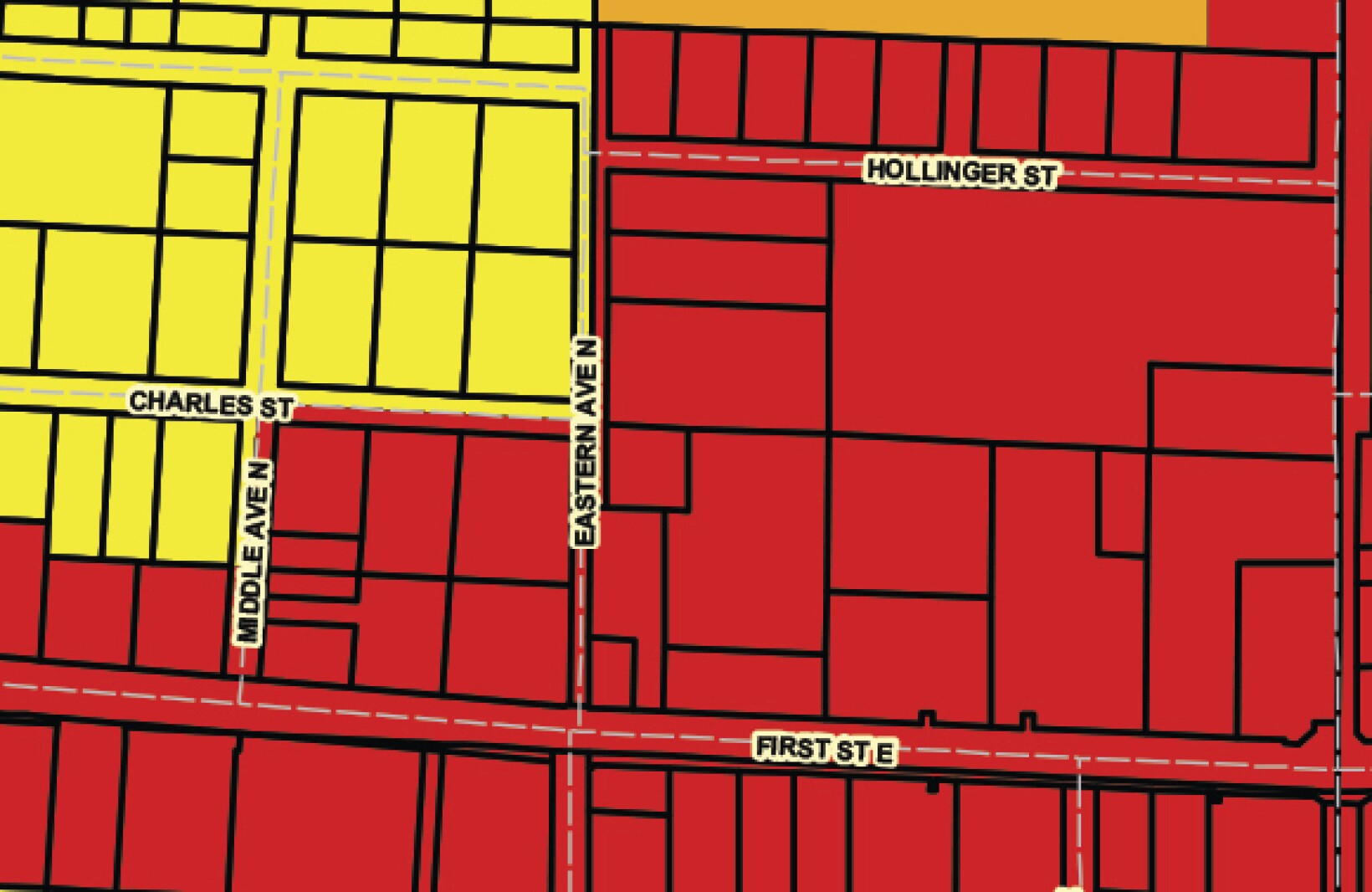The Park Rapids Planning Commission on Monday, Nov. 13 reconsidered requests by the Hubbard County Food Shelf, and for a second time, recommended that the city council deny them.
Background
On Sept. 18, the commission recommended that the city council deny a request to amend the comprehensive plan and future land use map on a residential parcel at the northwest corner of Eastern Ave. N. and Charles St. to a commercial land use, where the food shelf was looking to relocate. They then declined to consider a request to rezone the parcel from R-1 single family residential to B-1 highway business.
At its Sept. 26 meeting, the city council returned both requests to the planning commission for reconsideration, suggesting that they look at rezoning the parcel to R-B residential-business transitional, with or without amending the comprehensive plan.
City Planner Ben Oleson said this option would provide more protection from future commercial uses than a B-1 zoning. He said that in an R-B district, the food shelf could fall under a “catch-all” conditional use for “other residential, institutional or government service uses,” at the discretion of the planning commission and following a public hearing.
ADVERTISEMENT
Neighborhood petition
In a hearing on the comprehensive plan/future land use map change, neighboring resident Kristina Carrier produced a petition signed by 39 neighborhood residents opposed to bringing a commercial use to their residential neighborhood.
She also challenged the legality of “spot zoning,” whether the food shelf would qualify as an “institutional service” in an R-B district and the food shelf’s claim that no other lots were available.
Carrier urged the food shelf to look at other parcels already zoned for commercial use, and suggested the city could waive special assessments on a tax-forfeited parcel. She challenged many of the food shelf’s claims, including distance measurements and their denial that clients would park on the street.
Carrier said the food shelf’s hours of operation and the resulting amount of traffic would increase as need grows. She voiced concern about safety in the neighborhood, especially for children.
Stressing that opponents appreciate the food shelf’s services to the community, Carrier said their concern “is about this city’s promise to its constituents that when we choose to live in a residential block, we do not need to be concerned that it will be arbitrarily changed, contrary to the city’s promises and the law.”
She discussed the impact on property values, the city’s inability to control what type of business may follow the food shelf at that location and the precedent it would set to “open up any residential lot for potential business use.”
Opposition to rezoning
Bob Hansen, executive director of the food shelf, stressed the amount of time his board spent looking for properties that would serve their purpose. He responded to some of Carrier’s allegations of misrepresentation and said the city has always collected special assessments on previously tax-forfeited land.
When Hansen started to discuss financial challenges, commission member Scott Hocking stopped him. Hocking said the planning commission cannot take the applicant’s financial hardship into consideration.
ADVERTISEMENT
Neighborhood resident David Carrier added more arguments against re-planning the parcel. Noting that a residential lot is cheaper than commercial, he said commercial lots are available.
David argued that rising grocery prices and property values mean there will be increased need for the food shelf, and that their hours of operation will increase. He said increased foot traffic will bring a call for sidewalks, which will be assessed to Charles Street residents.
“Everyone of you, if this was next to your house, would you want it there?” he said. “One of the people that signed that petition was the lady that lives next to MAHUBE, and she said, ‘Please do not allow that next to your house. You will regret it, with all of the traffic.’”
Commission member Liz Stone said she sympathizes with the food shelf, but they have other options.
Hocking said there is no need to put the food shelf at the requested location.
Stone described residential districts as “precious” and opposed rezoning them, and other commission members agreed, with Joe Christensen cautioning against setting a precedent.
Hocking’s motion to deny the comprehensive plan/future land use map amendment passed 4-0.
Commission’s recommendations
In a separate hearing on rezoning the Eastern Ave./Charles St. parcel to R-B, Hansen said the food shelf has no intention of increasing its hours.
ADVERTISEMENT
He requested a clarification on the rules for the transitional district, in response to Katrina Carrier’s claim that the food shelf would not qualify.
Stone said they weren’t debating a use in an R-B district, but whether to rezone residential to R-B. However, Oleson called it a judgment call on the commission’s part.
Stone said it would be a “safer bet” for the food shelf to find a location already zoned R-B.
Oleson added they could also look for a B-1 or an I-1 industrial parcel.
Lou Eischens with Affinity Real Estate said there aren’t as many lots available in the city as people may think, and it isn’t easy for realtors to find what people need. She described several lots that aren’t served by water or sewer, and said the city is “busting out at the seams.”
Stone later commented that Eischens raised a valid concern that the commission may want to address in the future.
Stone’s motion to deny the rezoning request passed 4-0, based on a finding-of-fact that the request was not consistent with the city’s comprehensive plan.
Oleson said both recommendations will come before the city council at its Nov. 28 meeting.
